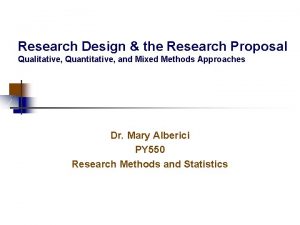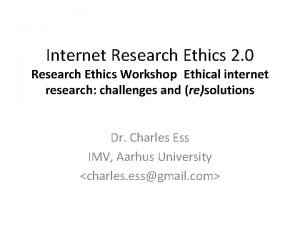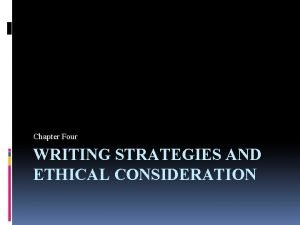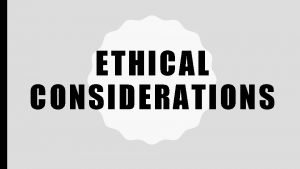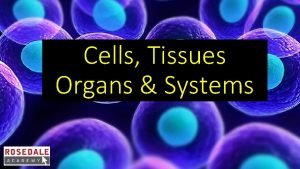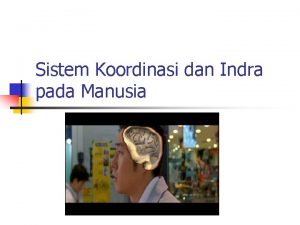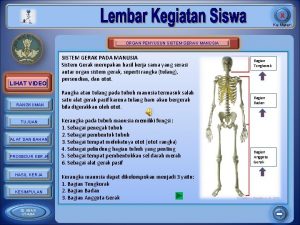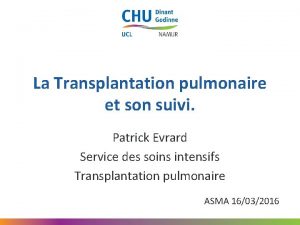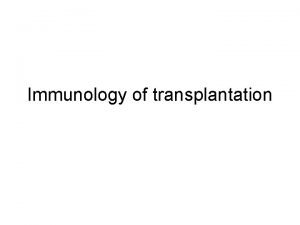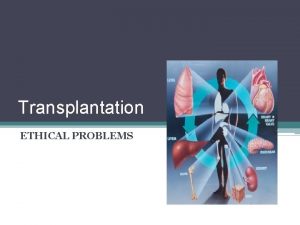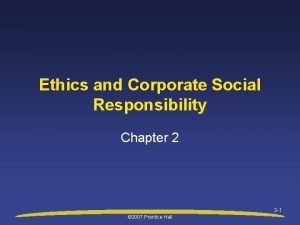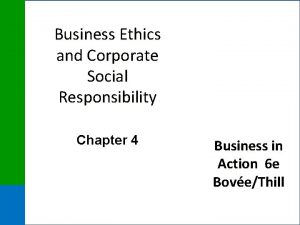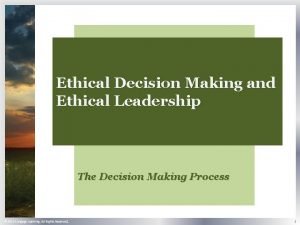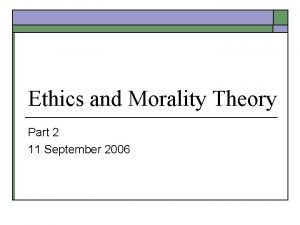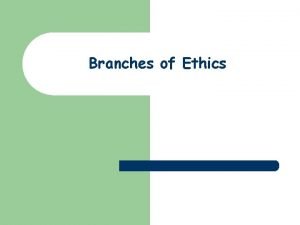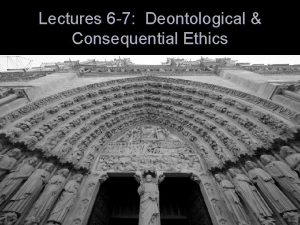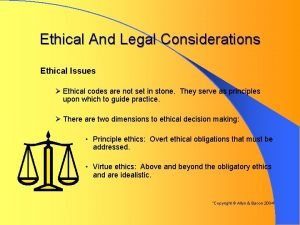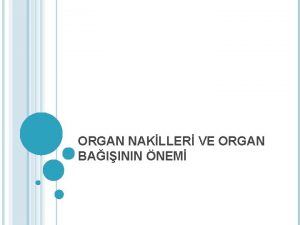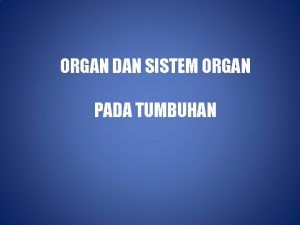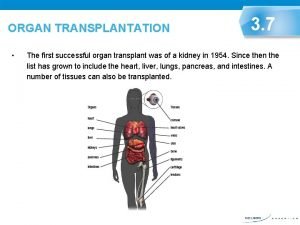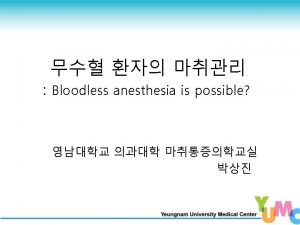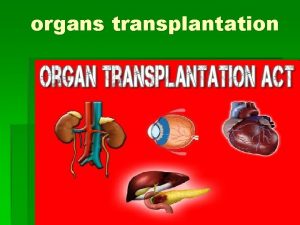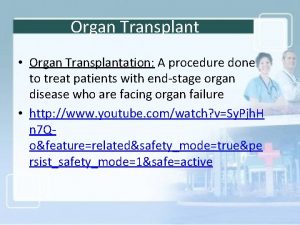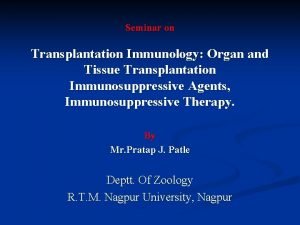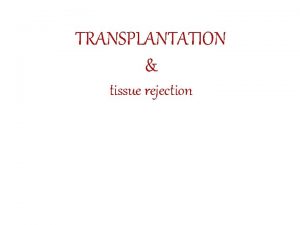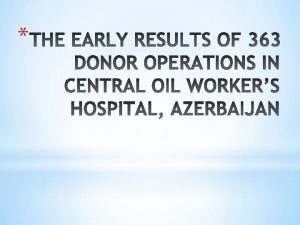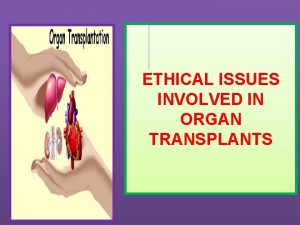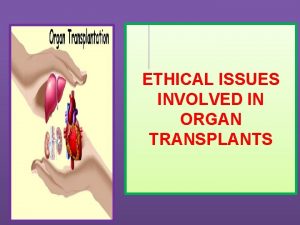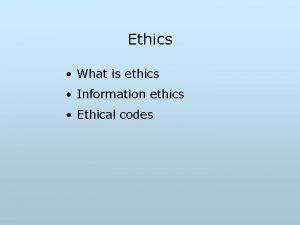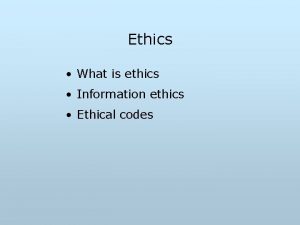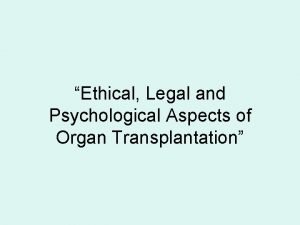Ethics of Organ Transplantation Ethical Considerations in Transplantation




























- Slides: 28

Ethics of Organ Transplantation

Ethical Considerations in Transplantation Bruce Gelb, MD FACS Director of Renal Transplantation Assistant Professor of Transplant Surgery Mary Lea Johnson Transplant Center at NYULMC

History – ~A. D. 300 School of Castile and Leon, ‘Saints Cosmas and Damian Healing a Christian with the Leg of a Dead Moor’, 1460 -1480

History - 1936 • First Modern Attempt (Allotransplantation) – Russia, 1936 • • • Surgeon: Yurii Voronoy Cadaveric kidney transplant Recipient: 26 F, mercury poisoning Donor 60 M, trauma. Kidney functioned for ~ 36 hours Recipient died 2 days after surgery

History - 1950 • First U. S. Attempt (kidney) • • • Cadaveric kidney transplant Recipient: 44 F, PCKD Donor COD: liver failure. Graft function for 10 months Recipient lived another 5 years

History - December 23, 1954

History Joseph Edward Murray (April 1, 1919 – November 26, 2012)

Richard Herrick – ESRD secondary to chronic glomerulonephritis Ronald Herrick – Donor (Died Age 79) Recipient lived for 9 years after transplant (kidney functioned until the time of death)

1931 -2010 Richard Herrick – ESRD secondary to chronic glomerulonephritis Ronald Herrick – Donor (Died Age 79) Patient Survival: 9 years (Myocardial Infarction) Graft Survival: 9 years

Were these surgeries ethical? ? ?

Is the concept of Ethics new? • Medical ethics have been present since Antiquity! – Hippocratic Oath – Formula Comitis Archiatrorum – 5 th Century – Conduct of a Physician - Ishaq ibn Ali al-Ruhawi – Maimonides - Jewish – Thomas Aquinas – Roman Catholic

Bioethics • Biology (Science) and Medicine Current Topics: • Abortion • Euthanasia • Surrogacy • Scarce Resources – Organ Donation and Allocation – Rare Drugs/New therapies


Ethics - Framework • • Autonomy Beneficence Non-Maleficence Justice • Respect • Truthfulness/Honesty

Finding Balance

Ethics - Framework • Autonomy – When does a patient have the right to make a decision, even if it seams wrong? • Recipient • Donor • Beneficence • Non-Maleficence • Justice • Respect • Truthfulness/Honesty

Ethics - Framework • Autonomy • Beneficence – Actions that benefit the well-being of others – Who deserves more benefit? • Non-Maleficence • Justice • Respect • Truthfulness/Honesty

Ethics - Framework • Autonomy • Beneficence • Non-Maleficence – “The treatment was a success, but the patient died” – Risk / Benefit analysis • Justice • Respect • Truthfulness/Honesty

Finding Balance The Double Effect Often, 1 action will have an effect on 2 ethical considerations

Ethics - Framework • • Autonomy Beneficence Non-Maleficence Justice – Equal access to treatment • Respect • Truthfulness/Honesty

Justice/Equality • A MAJOR issue when dealing with a scarce resource – Number of patients >>> available organs – Regional disparity – Waiting time – Organ donor registrations – Comfort with a living donor

Organ Allocation & Distributive Justice • • • To each person an equal share To each person according to need To each person according to effort To each person according to contribution To each person according to merit To each person according to free-market exchanges

Organ Allocation & Distributive Justice • The concept of Maximum Benefit – Medical need – Medical success • How is success defined? Survival Raising children Return to work Contribution to society Happiness

Ethical Questions Driven By the Organ Shortage • Should someone who has received one organ transplant be given a second transplant? Or should people who have not had a transplant be given priority over those who have already had one? • Should people whose lifestyle choices (smoking, drinking, drug use, obesity, etc. ) damaged their organ be given a chance at an organ transplant? • Should suicidal individuals be given an organ transplant? What if they attempted suicide in the past but are not currently contemplating suicide?

Ethical Questions Driven By the Organ Shortage • Should people who have young children be given an organ transplant over a single person? Over an elderly person? Should age and whether or not a person has children even matter? • Should people who can’t afford expensive anti-rejection drugs be passed over for a transplant? Should people who don’t have insurance and can’t pay for a transplant be allowed to go on the national waiting list? • Should condemned prisoners receive organ transplants? What if they are serving a life sentence without parole?

Ethical Considerations - Donors • • Registration Drives: Comission Opt-out: Ommission Mandated Choice Presumed Consent Incentives Removing disincentives At-Risk populations (Prisoners, mentally challenged, victims of abuse, illegal residents)

Ethical Considerations – Living Donors • • • Obligation Donor/Recipient disagreement Relationship Altruism Black Market

Selling Organs JAMA, 2002 • 96% of people sold their kidneys to pay off debt • 74% of people who sold their kidneys still had debt 6 years later • 86% of people reported a deterioration in their health status after donation • 79% would not recommend to others that they sell their kidneys
 Research paper appendices example
Research paper appendices example Ethical considerations examples
Ethical considerations examples Writing strategies and ethical considerations
Writing strategies and ethical considerations Ethical consideration in research example
Ethical consideration in research example Ethical consideration in experimental research sample
Ethical consideration in experimental research sample Organ organ pernafasan
Organ organ pernafasan Cell to tissue to organ to organ system to organism
Cell to tissue to organ to organ system to organism Organ penyusun sistem koordinasi
Organ penyusun sistem koordinasi Organ penyusun sistem gerak pada manusia
Organ penyusun sistem gerak pada manusia Organ and organ system
Organ and organ system Cell tissue organ organ system organism
Cell tissue organ organ system organism Patrick evrard mont godinne
Patrick evrard mont godinne Types of transplantation
Types of transplantation Cultural transplantation examples
Cultural transplantation examples Bone marrow transplantation sri lanka
Bone marrow transplantation sri lanka Stem cell or bone marrow transplantation bangkok
Stem cell or bone marrow transplantation bangkok Law of transplantation
Law of transplantation Perbedaan ethical dilemma dan ethical lapse
Perbedaan ethical dilemma dan ethical lapse Ethical lenses army
Ethical lenses army Csr and business ethics
Csr and business ethics Ethical habits
Ethical habits What is scholastic philosophy
What is scholastic philosophy Nasw essential steps for ethical problem solving
Nasw essential steps for ethical problem solving Descriptive ethics vs normative ethics
Descriptive ethics vs normative ethics 2 branches of ethics
2 branches of ethics Micro and macro ethics
Micro and macro ethics Normative vs descriptive ethics
Normative vs descriptive ethics Deontological ethics
Deontological ethics 6075 meaning
6075 meaning
